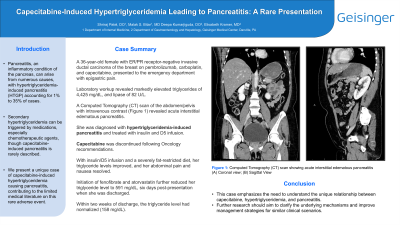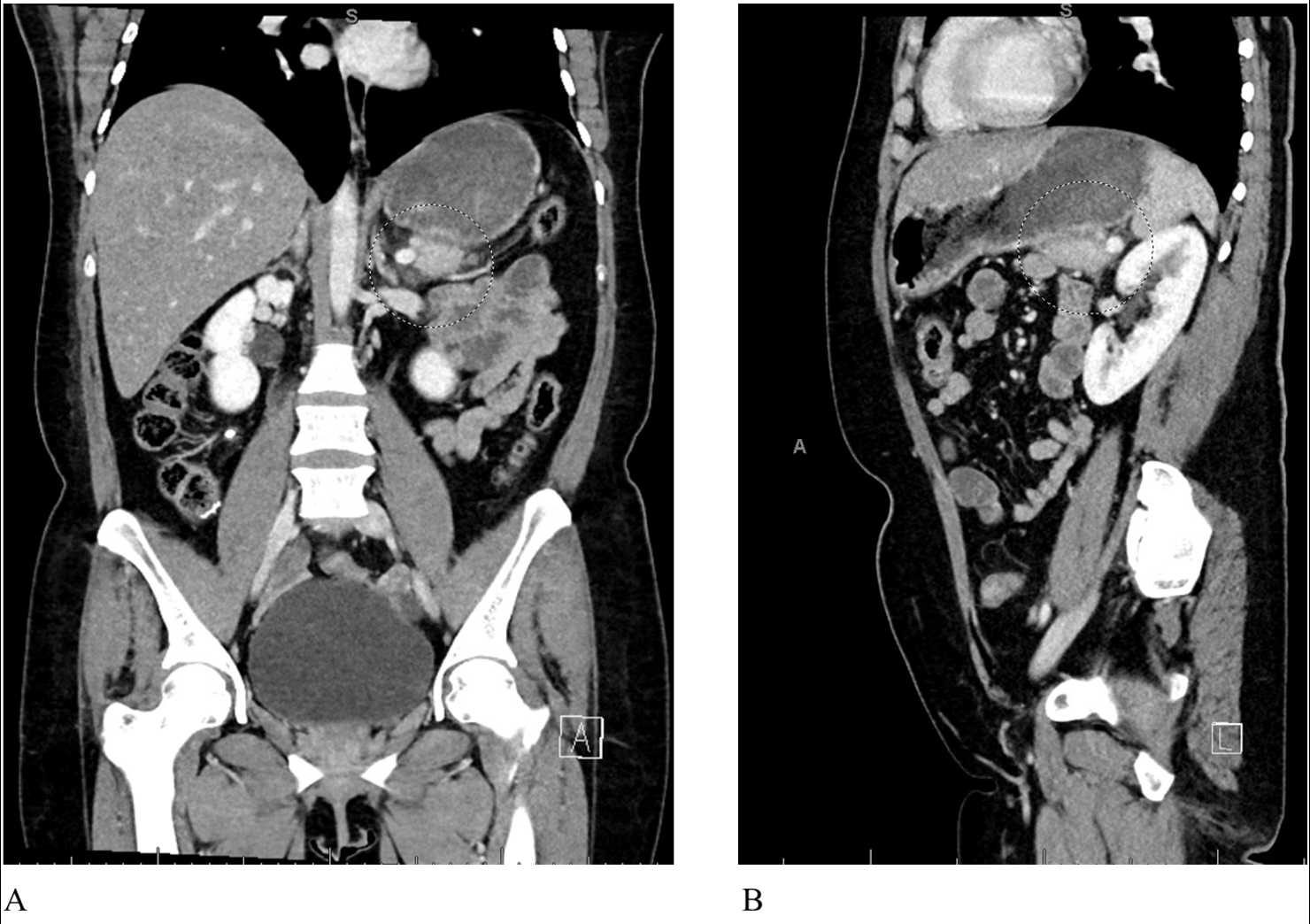Tuesday Poster Session
Category: Biliary/Pancreas
P3497 - Capecitabine-Induced Hypertriglyceridemia Leading to Pancreatitis: A Rare Presentation
Tuesday, October 29, 2024
10:30 AM - 4:00 PM ET
Location: Exhibit Hall E

.jpg)
Shriraj S. Patel, DO
Geisinger Medical Center
Danville, PA
Presenting Author(s)
Shriraj S. Patel, DO, Malak S. Al-Bitar, MD, Deepa S. Kumarjiguda, DO, Elisabeth S. Kramer, MD
Geisinger Medical Center, Danville, PA
Introduction: Pancreatitis, an inflammatory condition of the pancreas, has a wide range of etiologies, including hypertriglyceridemia-induced pancreatitis (HTGP), which accounts for 1 to 35% of cases. While secondary hypertriglyceridemia is often linked to medications, particularly chemotherapeutic agents, capecitabine-induced pancreatitis has rarely been described. Here, we present a unique case of capecitabine-induced hypertriglyceridemia causing pancreatitis, an occurrence seldom reported in medical literature.
Case Description/Methods: A 36-year-old female with ER/PR receptor-negative invasive ductal carcinoma of the breast on pembrolizumab, carboplatin, and capecitabine, presented to the emergency department with epigastric pain. A Computed Tomography (CT) scan of the abdomen/pelvis with intravenous contrast (Figure 1) revealed acute interstitial edematous pancreatitis. Laboratory workup revealed markedly elevated triglycerides of 4,425 mg/dL, and lipase of 82 U/L. She was diagnosed with hypertriglyceridemia-induced pancreatitis and treated with insulin and D5 infusion. Capecitabine was discontinued following Oncology recommendations. With insulin/D5 infusion and a severely fat-restricted diet, her triglyceride levels improved, and her abdominal pain and nausea resolved. Initiation of fenofibrate and atorvastatin further reduced her triglyceride level to 591 mg/dL six days post-presentation when she was discharged. Within two weeks of discharge, her triglyceride level had normalized (158 mg/dL).
Discussion: This case highlights the rare occurrence of Capecitabine-induced hypertriglyceridemia precipitating pancreatitis, a phenomenon sparsely documented in medical literature. The improvement in triglyceride levels following discontinuation of capecitabine supports its role as the causative agent. Moreover, this case underscores the need for a deeper understanding of the unique relationship between Capecitabine, hypertriglyceridemia, and pancreatitis to refine management strategies. Further research should focus on elucidating the underlying mechanism to optimize patient care in similar clinical scenarios.

Disclosures:
Shriraj S. Patel, DO, Malak S. Al-Bitar, MD, Deepa S. Kumarjiguda, DO, Elisabeth S. Kramer, MD. P3497 - Capecitabine-Induced Hypertriglyceridemia Leading to Pancreatitis: A Rare Presentation, ACG 2024 Annual Scientific Meeting Abstracts. Philadelphia, PA: American College of Gastroenterology.
Geisinger Medical Center, Danville, PA
Introduction: Pancreatitis, an inflammatory condition of the pancreas, has a wide range of etiologies, including hypertriglyceridemia-induced pancreatitis (HTGP), which accounts for 1 to 35% of cases. While secondary hypertriglyceridemia is often linked to medications, particularly chemotherapeutic agents, capecitabine-induced pancreatitis has rarely been described. Here, we present a unique case of capecitabine-induced hypertriglyceridemia causing pancreatitis, an occurrence seldom reported in medical literature.
Case Description/Methods: A 36-year-old female with ER/PR receptor-negative invasive ductal carcinoma of the breast on pembrolizumab, carboplatin, and capecitabine, presented to the emergency department with epigastric pain. A Computed Tomography (CT) scan of the abdomen/pelvis with intravenous contrast (Figure 1) revealed acute interstitial edematous pancreatitis. Laboratory workup revealed markedly elevated triglycerides of 4,425 mg/dL, and lipase of 82 U/L. She was diagnosed with hypertriglyceridemia-induced pancreatitis and treated with insulin and D5 infusion. Capecitabine was discontinued following Oncology recommendations. With insulin/D5 infusion and a severely fat-restricted diet, her triglyceride levels improved, and her abdominal pain and nausea resolved. Initiation of fenofibrate and atorvastatin further reduced her triglyceride level to 591 mg/dL six days post-presentation when she was discharged. Within two weeks of discharge, her triglyceride level had normalized (158 mg/dL).
Discussion: This case highlights the rare occurrence of Capecitabine-induced hypertriglyceridemia precipitating pancreatitis, a phenomenon sparsely documented in medical literature. The improvement in triglyceride levels following discontinuation of capecitabine supports its role as the causative agent. Moreover, this case underscores the need for a deeper understanding of the unique relationship between Capecitabine, hypertriglyceridemia, and pancreatitis to refine management strategies. Further research should focus on elucidating the underlying mechanism to optimize patient care in similar clinical scenarios.

Figure: Figure 1: Computed Tomography (CT) scan showing acute interstitial edematous pancreatitis. (A) Coronal view; (B) Sagittal view.
Disclosures:
Shriraj Patel indicated no relevant financial relationships.
Malak Al-Bitar indicated no relevant financial relationships.
Deepa Kumarjiguda indicated no relevant financial relationships.
Elisabeth Kramer indicated no relevant financial relationships.
Shriraj S. Patel, DO, Malak S. Al-Bitar, MD, Deepa S. Kumarjiguda, DO, Elisabeth S. Kramer, MD. P3497 - Capecitabine-Induced Hypertriglyceridemia Leading to Pancreatitis: A Rare Presentation, ACG 2024 Annual Scientific Meeting Abstracts. Philadelphia, PA: American College of Gastroenterology.
